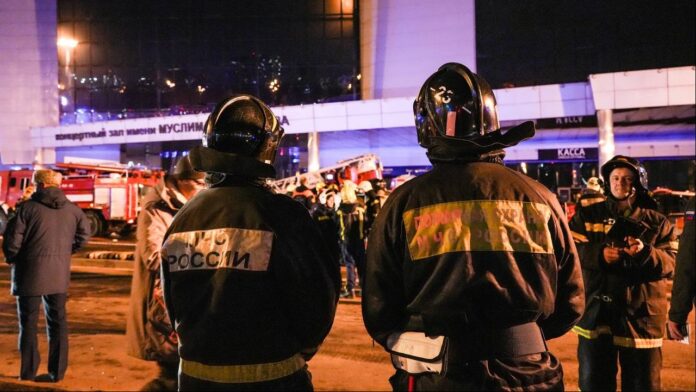On the evening of March 22, 2024, a devastating event unfolded at the Crocus City Hall music venue in Krasnogorsk, on the outskirts of Moscow, marking one of Russia’s darkest hours in recent history. Four assailants orchestrated a mass shooting and slashing attack on unsuspecting concertgoers, while also setting the venue ablaze with incendiary devices. This heinous act resulted in the death of at least 137 individuals and left more than 182 people injured due to gunshot wounds and complications from the ensuing fire. The Islamic State – Khorasan Province (IS–KP), an Afghanistan-based faction of the broader Islamic State network, asserted responsibility for this tragedy via a statement disseminated through the Amaq News Agency. The group further substantiated its claim by releasing a distressing video that depicted the carnage, including shootings and a beheading, accompanied by a message praising Allah and condemning “infidels.”
Russian President Vladimir Putin vehemently denounced the attack as a “barbaric terrorist act” and took immediate action by arresting the gunmen involved. He further declared March 24 as a national day of mourning, emphasizing the severity and the sorrow this event cast over the nation. The Russian Foreign Ministry labeled the attack as a terrorist act, situating it within a grim lineage of violence that Russia has faced over the years, dating back to high-profile incidents such as the Moscow apartment bombings in 1999, the Moscow theater hostage crisis in 2002, and the Beslan school siege in 2004. This attack stands as the deadliest terrorist incident in Russia since the Beslan tragedy.
The background of the Islamic State’s animosity towards Russia is multifaceted, involving Russia’s military interventions in Syria and the broader Middle Eastern region, as well as IS’s broader goal of waging jihad against states they perceive as adversaries. In particular, IS–KP has been vocal about its disdain for Russia, frequently targeting it in its propaganda materials. This group, known for its ruthlessness, was formed by dissidents from the Pakistan Taliban and Afghan fighters in 2014, pledging allegiance to then-ISIL leader Abu Bakr al-Baghdadi. It has since claimed responsibility for numerous attacks across Afghanistan and Pakistan, aiming to spread terror and demonstrate its ongoing relevance and power.
This latest attack underscores the persistent threat posed by radical extremist groups and the complex challenges facing global security. The choice of a music venue for the attack echoes previous IS attacks in Europe, suggesting a chilling pattern of targeting locations that symbolize cultural and social gathering. The aftermath of the attack has seen a concerted effort by Russian authorities to apprehend those involved and to reinforce security measures, reflecting the ongoing struggle against terrorism’s scourge on a global scale.
Image is licensed under the Creative Commons Attribution 4.0 License and was created by governor of Moscow Oblast (Q4151339).









